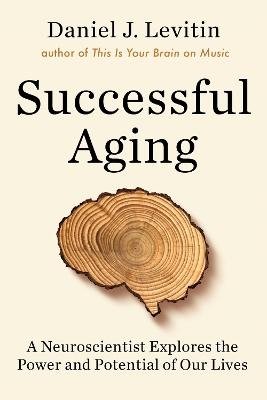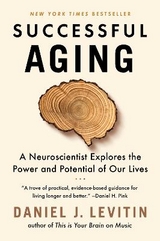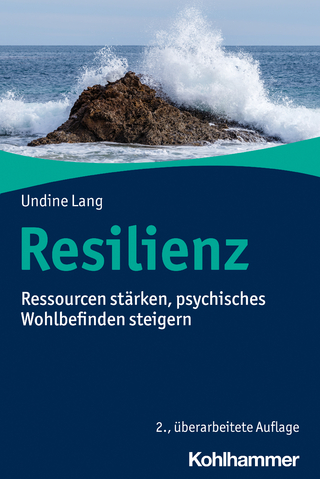
Successful Aging
Dutton (Verlag)
978-1-5247-4641-4 (ISBN)
- Titel erscheint in neuer Auflage
- Artikel merken
"Debunks the idea that aging inevitably brings infirmity and unhappiness and instead offers a trove of practical, evidence-based guidance for living longer and better."
Daniel H. Pink, author of When and Drive
SUCCESSFUL AGING delivers powerful insights:
Debunking the myth that memory always declines with age
Confirming that "health span" not "life span" is what matters
Proving that sixty-plus years is a unique and newly recognized developmental stage
Recommending that people look forward to joy, as reminiscing doesn't promote health
Levitin looks at the science behind what we all can learn from those who age joyously, as well as how to adapt our culture to take full advantage of older people's wisdom and experience. Throughout his exploration of what aging really means, using research from developmental neuroscience and the psychology of individual differences, Levitin reveals resilience strategies and practical, cognitive enhancing tricks everyone should do as they age.
Successful Aging inspires a powerful new approach to how readers think about our final decades, and it will revolutionize the way we plan for old age as individuals, family members, and citizens within a society where the average life expectancy continues to rise.
lt;b>Daniel J. Levitin, PhD, is a neuroscientist, cognitive psychologist, and bestselling author. He is Founding Dean of Arts & Humanities at the Minerva Schools at KGI in San Francisco, and Professor Emeritus of psychology and neuroscience at McGill University. He is the author of This Is Your Brain on Music, The World in Six Songs, The Organized Mind, and A Field Guide to Lies. He divides his time between Los Angeles and the San Francisco Bay Area.
1
Individual Differences and Personality
The search for the magic number
I visited a day care center for preschoolers recently and was struck by how early the differences in children's traits and individual dispositions show up. Some children are more outgoing, while others are shy; some like to explore the environment and take risks, while others are more fearful; some get along well with others and some are bullies-even by age four. Young parents who have more than one child see immediate differences in the dispositions of siblings, as well as differences between their offspring and themselves.
At the other end of life, there are clear differences in how people age-some people simply seem to fare better than others. Even setting aside differences in physical health, and the various diseases that might overcome us late in life, some older adults live more dynamic, engaged, active, and fulfilling lives than others. Can you look at a five-year-old and tell whether they will be a successful eighty-five-year-old? Yes, you can.
The discovery that aging and health are related to personality was the result of a lot of work. First, scientists had to figure out how to measure and define personality. What is it? How do you observe it accurately and quantitatively? Here, they may have taken inspiration from Galileo, who said, "The job of the scientist is to measure what is measurable and to render measurable that which is not." And so they did.
Among the most solid findings is that a child's personality affects adult health outcomes later in life. Take, for example, a child who was always getting into trouble in elementary school and continued to do so as a preteen. As a teenager, they might have smoked cigarettes, drunk alcohol, and used marijuana. In personality terms, we might say that this teenager was sensation- and adventure-seeking, high on the quality of extraversion, low on conscientiousness and emotional stability. The kid would have been at increased risk for hard drug use, or being killed in a motor vehicle accident while driving drunk. If they survived these increased risks in young adulthood but didn't change their habits, they'd enter middle age with a highly inflated risk of lung cancer from smoking or liver damage from drinking. Even more subtle behaviors can influence outcomes many decades later: Early and compulsive exposure to the sun and sun tanning; poor dental hygiene; poor exercise habits; and obesity all take their toll.
One of the pioneers in the relationship between personality and aging is Sarah Hampson, a research scientist at the Oregon Research Institute. As Hampson notes, "Lack of self-control may result in behaviors that increase the probability of exposure to dangerous or traumatic situations and adversely affect health through long-lasting biological consequences of stress." She has found that childhood is a critical period for laying down patterns of behavior with biological effects that endure into adulthood. If you want to live a long and healthy life, it helps to have had the right upbringing. Childhood personality traits, assessed in elementary school, predict a person's lipid levels, blood glucose, and waist size forty years later. These three markers, in turn, predict risk for cardiovascular disease and diabetes. The same childhood traits even predict life span.
Although these correlations between early childhood and late adulthood personality are robust, they tell only a part of the story. People age differently, and part of that story has to do with the interaction of genetics, environment, and opportunity (or luck). Scientists developed a mathematical way of tracking personality, comparing traits as they differ across individuals or change within a person over time. With it, we can talk about age-related, culture-related, and medically induced changes in personality, such
| Erscheinungsdatum | 01.01.2020 |
|---|---|
| Zusatzinfo | LINE ART/HALFTONES T/O |
| Verlagsort | London |
| Sprache | englisch |
| Maße | 150 x 229 mm |
| Gewicht | 590 g |
| Themenwelt | Sachbuch/Ratgeber ► Gesundheit / Leben / Psychologie ► Lebenshilfe / Lebensführung |
| Geisteswissenschaften ► Psychologie ► Allgemeine Psychologie | |
| Geisteswissenschaften ► Psychologie ► Entwicklungspsychologie | |
| Geisteswissenschaften ► Psychologie ► Verhaltenstherapie | |
| Naturwissenschaften ► Biologie ► Humanbiologie | |
| Naturwissenschaften ► Biologie ► Zoologie | |
| Schlagworte | aging • Applied Psychology • best nonfiction books of 2020 • Best Sellers • best sellers 2020 • best sellers list new york times 2020 • birthday gift • books best sellers • books on aging • boss gifts • boss gifts for men • brain • Cognitive Psychology • Geriatrics • gifts for parents • health books • Healthcare • Mental Health • Mortality • Neuroscience • new york time best sellers • New York Times • nurse gift • office gifts • Old age • organized • Personality psychology • Psychology • psychology books • Retirement • Retirement books • retirement gifts • retirement gifts for men • retirement gifts for women • science books • Wellness |
| ISBN-10 | 1-5247-4641-X / 152474641X |
| ISBN-13 | 978-1-5247-4641-4 / 9781524746414 |
| Zustand | Neuware |
| Informationen gemäß Produktsicherheitsverordnung (GPSR) | |
| Haben Sie eine Frage zum Produkt? |
aus dem Bereich



